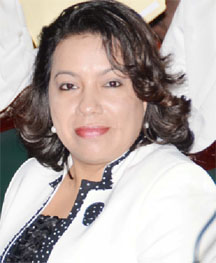As trade ministers gathered for a meeting on the strategic direction of the Council for Trade and Economic Development (COTED), Guyana’s Foreign Affairs Minister, Carolyn Rodrigues-Birkett said that the regional body cannot afford to do anything less than reinvent itself and with maximum haste.
With COTED’s remit as the promotion of the trade and economic development of the Community, she said that the talking had to be put aside and more action had to take place.

“We are certainly not short on vision, on orators and great speeches… We have to ensure that we accelerate implementation,” Rodrigues-Birkett, who is COTED chair, said at the opening of a special session yesterday ahead of the 37th Meeting of the COTED today.
She warned that since a significant part of the community’s development mandate devolves on the COTED, it should not be allowed, to operate as business as usual. “We should initiate critical changes here and this Special Session must not be another nice conversation. As trade Ministers let us take the tough decisions and commit to the follow through. We owe it to ourselves and the people,” she added.
Rodrigues-Birkett urged that COTED harness the ideas and input of the Caribbean public in its policymaking and implementation process.
She spoke of the need to engage the region’s private sector, youth, universities and technical colleges and the media in this process, and for exploration of opportunities in South America and with ACP partners. “In order to achieve these goals, we have to make some needful adjustments to our mode of operation, to the structure of our meetings, and the prioritisation of our agenda. This, I hope, we can accelerate over the next two days,” she said.
Despite the call for a strengthened partnership with the media, Guyanese reporters were asked to leave after Rodrigues-Birkett and Caricom Secretary-General Irwin LaRocque spoke at the opening, while members of the Caribbean media were to remain for the duration.
Meanwhile, LaRocque also urged the ministers to find a way to involve the private sector in driving the region’s growth.
“As the COTED strategises on its future direction, I urge the council to devise a mechanism to bring the regional private sector to the table. It is the private sector who produces. It is the private sector who trades,” LaRocque said.
LaRocque told the ministers that the evaluation of the current and future role of the COTED coincides with Caricom’s search for answers on the best way to advance the regional integration process, to alleviate the low levels of growth and high levels of debt and raise employment levels, particularly among our youth.
“This special session is therefore set against the background of a quest for innovative ideas to drive the progress of our integration movement,” he noted, while adding that COTED’s agenda and deliberations must be more strategic as it seeks to address the challenges faced by member states. Part of this approach, he noted, is the work of the preparatory meeting of the COTED allowing ministers the space for strategic deliberations.
LaRocque said that there should be a collective effort to put all our member states on a sound footing in order to tackle the harsh economic realities head on. For Caricom, he argued, enhancing competitiveness and expanding trade are crucial elements for propelling growth and improving the welfare of the region. “We must be fully aware of our challenges and limitations and seek to address these, both at the regional and national levels,” he said, and identified minimal export diversification and dependency on very few export markets, inadequate infrastructure, low competitiveness, high transport and transit costs, and difficulties attracting foreign investment among the challenges.
Finally, this is the opportune time to review how we are implementing the Caricom Single Market and Economy (CSME) and whether the way we are going about it is adequate to address the immediate concerns of Member States. Just as we have agreed that the Revised Treaty must now be reviewed in order to advance our integration arrangements,
In addition, LaRocque noted the need to examine the role of the Caricom Single Market and Economy (CSME) in addressing the economic challenges of member states, saying looking at how it is being implemented and whether it is adequate to address the immediate concerns of member states is timely. He did, however, mention his conviction that the CSME is the best option for addressing the region’s economic challenges. “…The pillar of economic integration rests largely on the shoulders of the COTED and, as you deliberate on forging a strategy for the future operations of this Council and seek answers to boost our growth and development, there is an urgency which must infuse your deliberations,” he further said.





